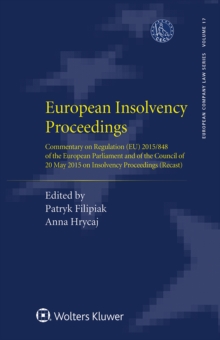
Towards a Sustainable European Company Law : A Normative Analysis of the Objectives of EU Law, with the Takeover Directive as a Test Case EPUB
by Beate Sjafjell
Part of the European Company Law Series series
EPUB
Description
No one doubts any longer that sustainable development is a normative imperative. Yet there is unmistakably a great reluctance to acknowledge any legal basis upon which companies are obliged to forgo 'shareholder value' when such a policy clearly dilutes responsibility for company action in the face of continuing environmental degradation.
Here is a book that boldly says: 'Shareholder primacy' is wrong. Such a narrow, short-term focus, the author shows, works against the achievement of the overarching societal goals of European law itself. The core role of EU company and securities law is to promote economic development, notably through the facilitation of market integration, while its contributory role is to further sustainable development through facilitation of the integration of economic and social development and environmental protection. There is a clear legal basis in European law to overturn the poorly substantiated theory of a 'market for corporate control' as a theoretical and ideological basis when enacting company law.
With rigorous and persuasive research and analysis, this book demonstrates that:
- European companies should have legal obligations beyond the maximization of profit for shareholders;
- human and environmental interests may and should be engaged with in the realm of company law; and
- company law has a crucial role in furthering sustainable development.
As a test case, the author offers an in-depth analysis of the Takeover Directive, showing that it neither promotes economic development nor furthers the integration of the economic, social and environmental interests that the principle of sustainable development requires.
This book goes to the very core of the ongoing debate on the function and future of European company law. Surprisingly, it does not make an argument in favour of changing EU law, but shows that we can take a great leap forward from where we are. For this powerful insight - and the innumerable recognitions that support it - this book is a timely and exciting new resource for lawyers and academics in 'both camps': those on the activist side of the issue, and those with company or official policymaking responsibilities.
Information
-
Download - Immediately Available
- Format:EPUB
- Pages:592 pages
- Publisher:Wolters Kluwer
- Publication Date:26/03/2009
- Category:
- ISBN:9789041144515
Information
-
Download - Immediately Available
- Format:EPUB
- Pages:592 pages
- Publisher:Wolters Kluwer
- Publication Date:26/03/2009
- Category:
- ISBN:9789041144515










